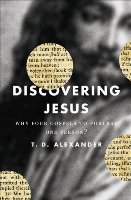When I started out as a preacher if you had asked me what was my favorite portion of Scripture I’m sure I would have said the Epistles – Paul’s epistles, to be precise. I still love them as much, and I have grown in appreciation for each portion of Scripture for its own revelation from God. But over the years the Gospels have increasingly captured more and more of my attention – and affection – as I learned more of their canonical centrality and of the richness of their presentation of Jesus. And for years I have appreciated scholars who can help us understand Jesus – and the Bible story – more clearly as seen through the lenses of Matthew, Mark, Luke, and John.
This is the point of T. Desmond Alexander’s Discovering Jesus? Why Four Gospels to Portray One Person, and today he is here to talk about his work.
 Books At a Glance (Fred Zaspel):
Books At a Glance (Fred Zaspel):
Describe for us what you are trying to accomplish in this book – and how did it come about? And perhaps you can explain for us your concern that for many our only acquaintance with the Gospels is “piecemeal.”
Alexander:
The origins of this book go back some way to a time when I taught a course on the Gospels to university students. There are numerous books on the Gospels, but I found that most did not provide a satisfactory overview of what was distinctive about each account of Jesus’ life. I was disappointed by how New Testament scholars failed to read each gospel as an entity in its own right. Additionally, having spent much of my academic career working in the Old Testament, I was also struck by a frequent failure to appreciate the presence of Old Testament themes in the Gospels. This is especially so as regards the Gospel of John. I was also troubled by the fact that most Christians are unable to distinguish one gospel account of the life of Jesus from another. As you say, our acquaintance with the Gospels is ‘piecemeal.’ We tend to harmonise the Gospels in our thinking. This has resulted in a failure to appreciate how the four Gospel writers give complementary, but distinctive, portraits of Jesus. Each gospel account is a true record of the life of Jesus, but each writer emphasizes different themes. When all four portraits of Jesus are clearly seen, they produce a much richer and deeper understanding of Jesus.
After something of a change in career, I had an opportunity to teach a course on Jesus for church members. The present book is a reworking of this course material; for this reason, the contents are presented in a way that should be accessible to most readers. I’ve not written for scholars, but fellow believers.
Books At a Glance:
How would you state the distinctive theme of each of the four Gospels?
Alexander:
As I set out in my book, I think the distinctive themes of the four Gospels may be summarized as follows:
in Matthew, Jesus is the son of David who establishes the kingdom of heaven;
in Mark, Jesus is the Son of God who suffers to ransom others;
in Luke, Jesus is the savior of the world who seeks the lost;
in John, Jesus is the Lamb of God who brings eternal life through a new exodus.
Books At a Glance:
Give us a sample – your choice – of how a given Evangelist emphasizes a theme that is distinctive – even if not unique – to his Gospel.
Alexander:
Let’s take Matthew’s Gospel. Matthew is especially interested in proclaiming that Jesus is the promised Messiah, who fulfils Old Testament expectations linked to the Davidic dynasty. For this reason Matthew begins his Gospel by introducing Jesus as the ‘son of David’. This is immediately followed by a genealogy that traces the ancestry of Joseph back to King David. From the outset Matthew intends us as readers to appreciate this link between Jesus and the royal line of David. Matthew builds on this throughout his Gospel by noting how, among other things, Jesus has authority. Consequently, he ends his Gospel by affirming that all authority in heaven and on earth has been given to Jesus. While the concept of Jesus as the Davidic king who ushers in the kingdom of God is not unique to Matthew’s Gospel, Matthew gives considerably more emphasis to this than any of the other gospel writers.
 Books At a Glance:
Books At a Glance:
Let’s take Mark and John. Both present Jesus in ways that are very much the same – Jesus is the Son of God, the fulfillment of the messianic promise, and so on. For both of them the true identity of Jesus is the great concern. So, how are these Gospel writers distinct in their presentation of Jesus?
Alexander:
As scholars have often noted, one of the significant differences between the Gospels of Mark and John concerns incidents involving unclean or evil spirits. Mark draws attention to Jesus confronting unclean spirits, but John makes no mention of such events. For Mark, Jesus’ power over these evil spirits and his other supernatural actions point strongly to his divine nature as the unique Son of God. Mark then proceeds to show how the all powerful Jesus gives up his life as a ransom for others. Remarkably, Mark notes that at the crucifixion a Gentile centurion speaks on Jesus as the ‘Son of God’. For Mark, it is important that his readers also see the crucified Jesus as the Son of God.
Although John also affirms that Jesus is the unique Son of God, John is more interested in explaining how Jesus gives up his life at Passover as the Lamb of God in order to deliver people from the slavery to evil and bring them into God’s presence. To make this connection between Jesus and the Passover lamb, John shapes his Gospel quite differently to the presentation found in Matthew, Mark and Luke. Thus, for example, John describes how Jesus attends three different Passovers in Jerusalem. As a result, most of John’s Gospel locates Jesus in or close to Jerusalem. This contrasts with Mark’s Gospel, where Jesus spends considerable time in the region of Galilee. By highlighting different events in Jesus’ life, Mark and John present us with two distinct, but complementary, explanations of who Jesus is.
Books At a Glance:
In the early centuries of the church, Matthew’s Gospel was believed to have been written first. Most scholars today believe that Mark’s Gospel was first. Does this question make an interpretive difference at any point?
Alexander:
The order in which the Gospels were written is …
Note: Stay tuned – we will continue our interview with Dr. Alexander here tomorrow!

